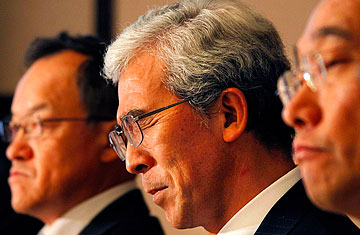
Clueless Olympus' Mori, center, and Takayama, left
Sometimes capitalism doesn't make sense, let alone dollars. These days in the West, when a major financial institution gives a deadbeat customer a loan and the borrower defaults, the imprudent lender is bailed out with hard-earned taxpayer money. In Japan, it can get even less rational: a publicly listed brand-name corporation spends hundreds of millions of dollars to buy companies that at the time of the acquisitions have zero revenue and dubious assets. That's what Olympus, the globally renowned manufacturer of, among other things, high-end photographic equipment, did — a sin big enough to cause Prime Minister Yoshihiko Noda to comment. Noda says his nation should not be tarred by the actions of one company; he told the Financial Times that the world might "generalize Japan is a country that [does not follow] the rules of capitalism. Japanese society is not that kind of society."
Actually, it is. Japan Inc. is notorious for poor board and shareholder oversight. While the apparent lack of credible checks on top management is not unique, the details of the Olympus case are still stunning. From 2006 to '09, Olympus made four acquisitions, three of which had nothing to do with the company's core businesses, which are digital imaging and medical paraphernalia. Those three outfits, for which Olympus paid close to $1 billion, already had their assets written down to just a fraction of that sum. Boneheaded acquisitions occur all the time. But the trio was registered in the Cayman Islands, the Caribbean tax haven, and dissolved shortly after the deals were done. Hisashi Mori, an Olympus vice president, told reporters his firm knows only the names of the Caymans entities to which the payments were made and their bank-account numbers. "We know nothing," Mori said, "about who they are."
In the fourth case, Olympus, after acquiring a British-based medical-instruments company for $2.2 billion in 2008, forwarded $687 million as "a transaction fee" to two investment bankers — also into a Caymans account that subsequently vanished. M&A executives can earn hefty fees for sizable deals. But the "fee" was a third of the size of the transaction — astounding given that a typical commission is 1%. "Where do I sign up for their business?" a Tokyo-based M&A banker cracked to me.
Olympus' board hired an auditor in 2009 to go over the deals and payments. Its report, according to the Wall Street Journal, said the directors did nothing wrong. Perhaps so, but this was all too much for Michael Woodford, a British citizen and 30-year Olympus veteran who earlier this year was promoted to president and then CEO. (Woodford is a rare gaijin — foreigner — to head a top Japanese company, the most prominent being Carlos Ghosn of Nissan-Renault and Howard Stringer of Sony.) Woodford wrote a memo to chairman (and former CEO) Tsuyoshi Kikukawa in which he described "a catalogue of calamitous errors and exceptionally poor judgment." He called on Kikukawa to resign. Instead, Olympus' board sacked Woodford. Kikukawa said Woodford's questions about the deals were "aberrant" and "unforgivable." He even played the gaijin card, saying that Woodford "did not like Japan." After Woodford went public, Kikukawa himself had to go.
Japan Inc. has no patent on big corporate scandals. Before the current Wall Street debacle, there was Enron and WorldCom. What sets the Olympus affair apart is the possibility of involvement by outside criminal elements. The company is now being investigated by the FBI and the U.K.'s Serious Fraud Office.
Few in Japan would be surprised to learn that local executives and criminals are hand in glove. In 1997, the chairman of Japan's then largest bank, Dai-Ichi Kangyo, was convicted of lending billions of yen to members of Japanese organized-crime groups, collectively called the yakuza. Three years ago, in response to reports that organized crime was investing large sums in public companies, Japan's Securities and Exchange Surveillance Commission compiled an index of more than 50 listed firms with alleged yakuza ties. Olympus' new president, Shuichi Takayama, says he's "absolutely not aware" of any criminal involvement.
Despite its two lost decades of economic torpor, Japan has, at the same time, developed a reputation as a creative hub of hip, commercial cool. Think of its animation studios, design shops, or any number of successful e-commerce businesses — all genuine shoots of reinvention. But the Olympus scandal shows that local boardrooms can still be secretive, deceitful and perhaps even criminal. Those, alas, are still Japan's rules of capitalism.
